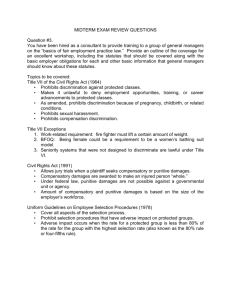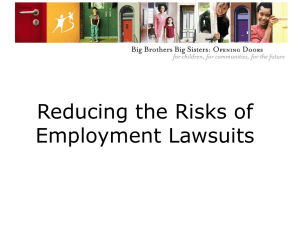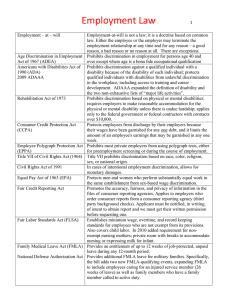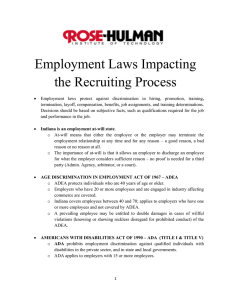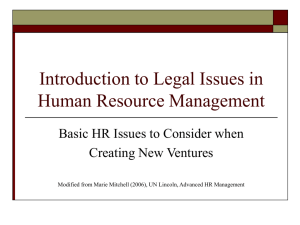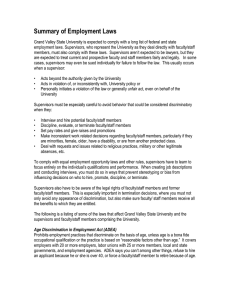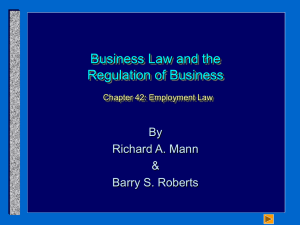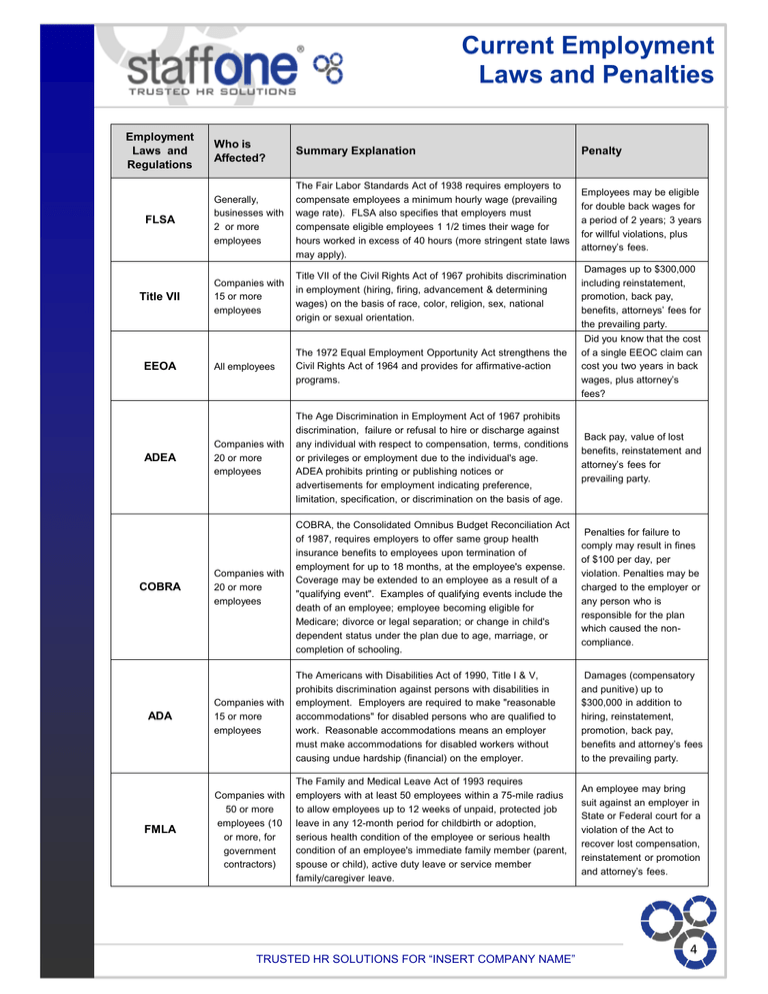
Current Employment
Laws and Penalties
Employment
Laws and
Regulations
Who is
Affected?
Summary Explanation
Penalty
FLSA
Generally,
businesses with
2 or more
employees
The Fair Labor Standards Act of 1938 requires employers to
compensate employees a minimum hourly wage (prevailing
wage rate). FLSA also specifies that employers must
compensate eligible employees 1 1/2 times their wage for
hours worked in excess of 40 hours (more stringent state laws
may apply).
Employees may be eligible
for double back wages for
a period of 2 years; 3 years
for willful violations, plus
attorney’s fees.
Title VII
Companies with
15 or more
employees
Title VII of the Civil Rights Act of 1967 prohibits discrimination
in employment (hiring, firing, advancement & determining
wages) on the basis of race, color, religion, sex, national
origin or sexual orientation.
All employees
The 1972 Equal Employment Opportunity Act strengthens the
Civil Rights Act of 1964 and provides for affirmative-action
programs.
Companies with
20 or more
employees
The Age Discrimination in Employment Act of 1967 prohibits
discrimination, failure or refusal to hire or discharge against
any individual with respect to compensation, terms, conditions
or privileges or employment due to the individual's age.
ADEA prohibits printing or publishing notices or
advertisements for employment indicating preference,
limitation, specification, or discrimination on the basis of age.
Back pay, value of lost
benefits, reinstatement and
attorney’s fees for
prevailing party.
Companies with
20 or more
employees
COBRA, the Consolidated Omnibus Budget Reconciliation Act
of 1987, requires employers to offer same group health
insurance benefits to employees upon termination of
employment for up to 18 months, at the employee's expense.
Coverage may be extended to an employee as a result of a
"qualifying event". Examples of qualifying events include the
death of an employee; employee becoming eligible for
Medicare; divorce or legal separation; or change in child's
dependent status under the plan due to age, marriage, or
completion of schooling.
Penalties for failure to
comply may result in fines
of $100 per day, per
violation. Penalties may be
charged to the employer or
any person who is
responsible for the plan
which caused the noncompliance.
ADA
Companies with
15 or more
employees
The Americans with Disabilities Act of 1990, Title I & V,
prohibits discrimination against persons with disabilities in
employment. Employers are required to make "reasonable
accommodations" for disabled persons who are qualified to
work. Reasonable accommodations means an employer
must make accommodations for disabled workers without
causing undue hardship (financial) on the employer.
Damages (compensatory
and punitive) up to
$300,000 in addition to
hiring, reinstatement,
promotion, back pay,
benefits and attorney’s fees
to the prevailing party.
FMLA
Companies with
50 or more
employees (10
or more, for
government
contractors)
The Family and Medical Leave Act of 1993 requires
employers with at least 50 employees within a 75-mile radius
to allow employees up to 12 weeks of unpaid, protected job
leave in any 12-month period for childbirth or adoption,
serious health condition of the employee or serious health
condition of an employee's immediate family member (parent,
spouse or child), active duty leave or service member
family/caregiver leave.
An employee may bring
suit against an employer in
State or Federal court for a
violation of the Act to
recover lost compensation,
reinstatement or promotion
and attorney’s fees.
EEOA
ADEA
COBRA
TRUSTED HR SOLUTIONS FOR “INSERT COMPANY NAME”
Damages up to $300,000
including reinstatement,
promotion, back pay,
benefits, attorneys’ fees for
the prevailing party.
Did you know that the cost
of a single EEOC claim can
cost you two years in back
wages, plus attorney’s
fees?
4

